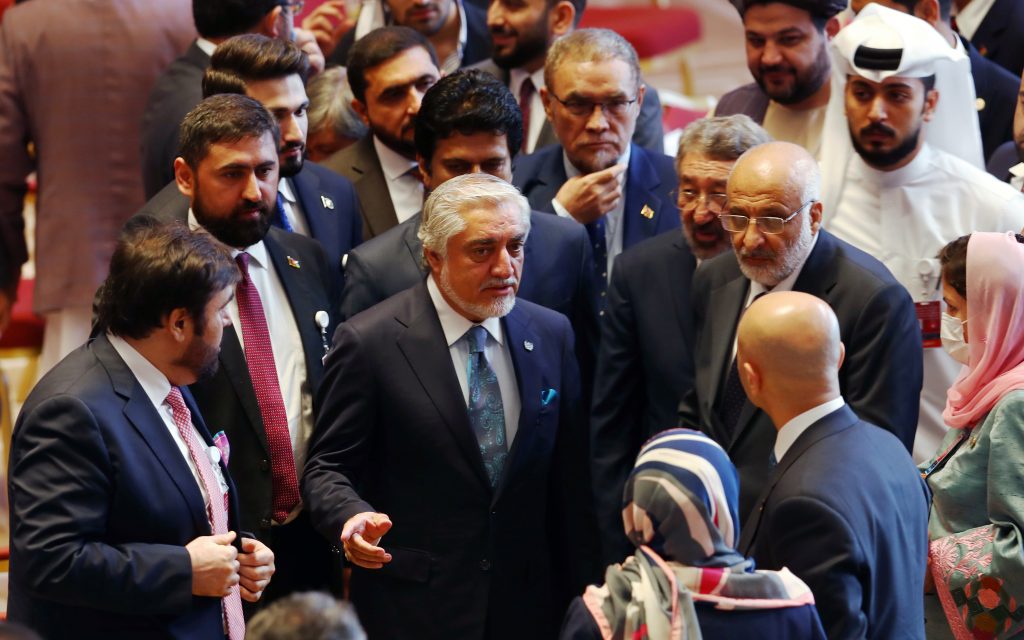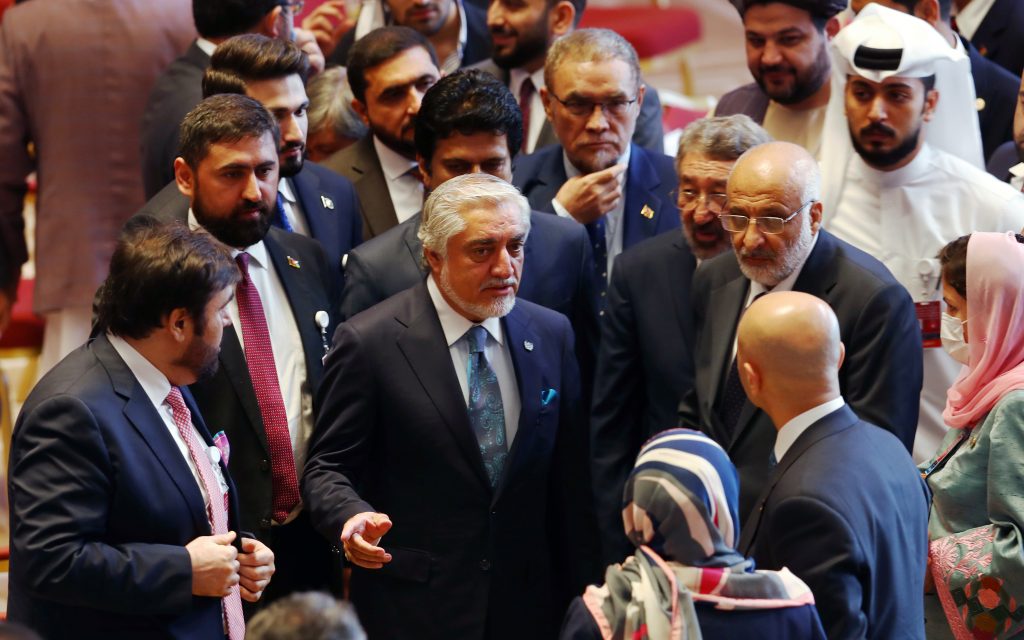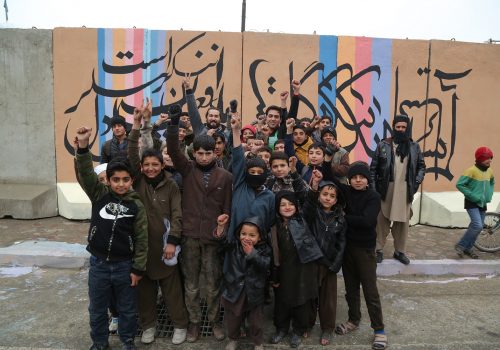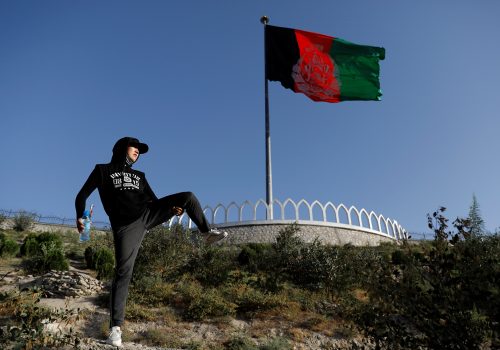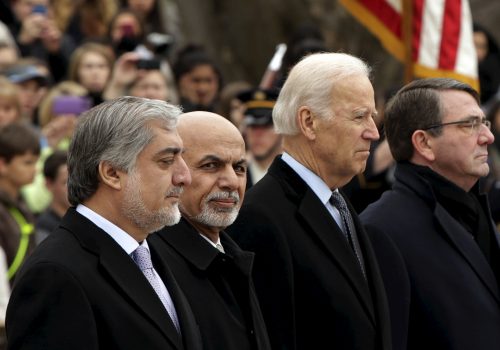On November 25, 2020, the Atlantic Council’s South Asia Center and the Embassy of Afghanistan in Washington D.C. jointly hosted H.E. Ambassador Roya Rahmani, Mr. Lakhdar Brahimi, Dr. Patricia Karam, and Dr. Daniel Corstange for a conversation about the Ta’if Agreement that ended Lebanon’s civil war in 1989 and the lessons that can be learned from the Lebanese peace process for the ongoing Afghan peace talks.
In his welcoming remarks, director of the Atlantic Council’s South Asia Center Dr. Irfan Nooruddin introduced Afghan Ambassador to the United States, H.E. Roya Rahmani, who gave opening remarks, as well as Mr. Harris Samad, Assistant Director of the South Asia Center and moderator of the event.
Ambassador Rahmani began by highlighting the Afghan Embassy’s partnership with the Atlantic Council. The Ambassador then highlighted the importance of consensus-building between all parts of society in creating peace, arguing that women and youth must be involved in any peace talks and must have a seat at the table. Secondly, she noted that peace is truly a process, and securing an agreement is only the beginning. It is vital to build a culture of peace to ensure that it continues. Afghans have spent twenty years building the democratic and economic development infrastructure required for a lasting peace, she explained, and the process cannot be rushed now. Recalling that the Kabul of her youth was fragrant with the flowers in the houses and streets – with each season bringing a different fragrance – Ambassador Rahmani explained that in recent years, the cities of Afghanistan have been filled with the scent of fear, and she hopes that can soon change.
Mr. Harris Samad then set the stage for the discussion and introduced the panelists: Mr. Lakhdar Brahimi, Former Arab League Special Envoy for Lebanon & Former United Nations Special Envoy for Afghanistan; Dr. Patricia Karam, Regional Director of the Middle East North Africa Division at the International Republican Institute; and Dr. Daniel Corstange, Associate Professor of Political Science and of International and Public Affairs at Columbia University.
Mr. Samad began by explaining how the 1989 Ta’if Agreement – which ended fifteen years of war in Lebanon – laid out future reforms which never came to fruition, and asked Mr. Brahimi about the implications of the failure of those reforms for Afghanistan. Mr. Brahimi began by noting his lifelong interest in Afghanistan, and expressed his best wishes for the peace process. He then posited that there may be little to learn from Lebanon’s peace agreement, because it was very specific to the situation in Lebanon at that time. He highlighted that the best conditions for a peace process is for the people fighting on the ground to recognize that they have not won, they cannot win, and that they need to compromise. In 1988 and 1989, this is what happened in Lebanon. Everyone was trying to get ready for a post-Cold War world, argued Mr. Brahimi, and all the factions inside the country were therefore ready to deal. Mr. Brahimi noted his direct involvement in the process at the time, explaining that in the years since the negotiations, the Lebanese people have been very critical of the agreement.
Dr. Patricia Karam argued that power-sharing efforts in Afghanistan’s case might exacerbate the problem and hamper long-term state building efforts. Temporary power-sharing structures can end up becoming permanent, and this causes national identity to be broken into factional identities. She used the example of Iraq as a cautionary tale, in which the power-sharing agreement has solidified divisions between ethnic and religious groups. Dr. Daniel Corstange elaborated on Dr. Karam’s point, acknowledging the challenge of separating people into different religious groups and codifying those divisions into a peace agreement. He agreed that doing so could cause people to think of themselves as being primarily a part of their ethnic or religious group rather than their country.
The panelists then discussed the development of Lebanon’s civil society in the post-peace period. Dr. Karam asserted that some Lebanese today live in an “officially sanctioned amnesia” that discourages them from looking back to what happened during the war. Without a more comprehensive truth-seeking process, she argued, it is not possible to engage in critical thinking on the consequences of the war and address reparations for the victims. One of the most devastating consequences of the amnesty that came out of the peace agreement is a culture of impunity and lack of accountability, she argued. Where rights-based culture is happening, we should enhance it, and this should be the foundation for more accountability.
Dr. Corstange noted that in Lebanon and many other countries, people want a role for religion in government, but are also content with basic democratic principles. The challenge, however, is that in Lebanon, illiberal and anti-democratic developments emerge more as a result of sectarian political competition rather than religious influence. This can be traced to longstanding patronage practices in government. Mr. Brahimi further elaborated that religion in Lebanon is considered a part of personal identity, and should be understood in that context rather than in the context of a religion’s specific practices. He highlighted the non-sectarian nature of civil societies,as well as their limited influence in politics. The political movement that has emerged in the last year, however, is totally against identity politics and wants to turn Lebanon into a 21st century country, Mr. Brahimi asserted.
Mr. Samad then turned the conversation towards the situation in Afghanistan. Dr. Karam spoke to the effect of social and digital media on the peace negotiations in Afghanistan. She gave the Afghan government credit for fostering free expression and its relative lack of censorship. Dr. Karam stated that the peoples’ voices should be further amplified. Mr. Brahimi spoke to how Afghanistan can learn from Lebanon on how to deal with the issue of amnesty for past lawbreakers. He specifically stressed the importance of rule of law: a strong police force, well-run prisons, and most importantly a fair criminal justice system.
Dr. Corstange then discussed his research on foreign intervention in conflict and voting attitudes in a given electorate, noting that intervention by a foreign actor on behalf of one faction within a country (in this case, the United States and NATO as proponents of democracy in Afghanistan) may polarize that country. The implication here is that if there is a non-partisan intervention, that can be an opportunity to build broader support within the country for the intervention. Dr. Corstange argued that foreign actors must be careful in doing anything that upsets the existing balance of power within countries. He also noted that there is not much of an anti-America bias throughout the world, but rather a bias toward certain actions by intervening countries.
The conversation then turned to address questions from the audience. Asked whether the Taliban could become a Hezbollah-like group within Afghanistan, Dr. Karam argued that Lebanon’s peace agreement allowed Hezbollah to keep its military intact and become a state within a state. She argued that the longer we allow these armed non-state actors to exist, the more they will influence the country (for both Hezbollah in Lebanon and the Taliban in Afghanistan). These organizations are an existential threat, she posited, and in those cases foreign intervention might be the only possible solution.
Mr. Brahimi noted that Hezbollah began as a small entity, but was supported and built up by Iran. In Afghanistan, however, we must recognize that the Taliban was a much bigger presence, controlling 95% of the country in 2001. He argues that it was a mistake to not engage with the Taliban after the emirate was toppled. In addition, Mr. Brahimi noted that Hezbollah has huge support from outside of Lebanon. The question then, he posited, is can the Taliban count on similarly strong outside support? Dr. Corstange agreed with Mr. Brahimi’s assessment, noting that the extent to which the Taliban can operate as a separate government will be influenced strongly by their level of foreign financial support.
Mr. Samad ended the discussion by thanking the panelists and Ambassador Rahmani. In closing out the conversation, Dr. Nooruddin noted that the conversation was held against the backdrop of a recent terror attack in Bamiyan, and highlighted the critical importance of building peace in Afghanistan and other countries. Overall, the conversation highlighted the importance of taking stock of different conflict resolution methods to see what the international community can learn as well as what examples may be too context specific to extrapolate to other peace processes.
The webinar can be viewed here and a transcript here.

The South Asia Center is the hub for the Atlantic Council’s analysis of the political, social, geographical, and cultural diversity of the region. At the intersection of South Asia and its geopolitics, SAC cultivates dialogue to shape policy and forge ties between the region and the global community.
Related content
Image: Chairman of the High Council for National Reconciliation Abdullah Abdullah speaks during talks between the Afghan government and Taliban insurgents in Doha, Qatar September 12, 2020. REUTERS/Ibraheem al Omari
